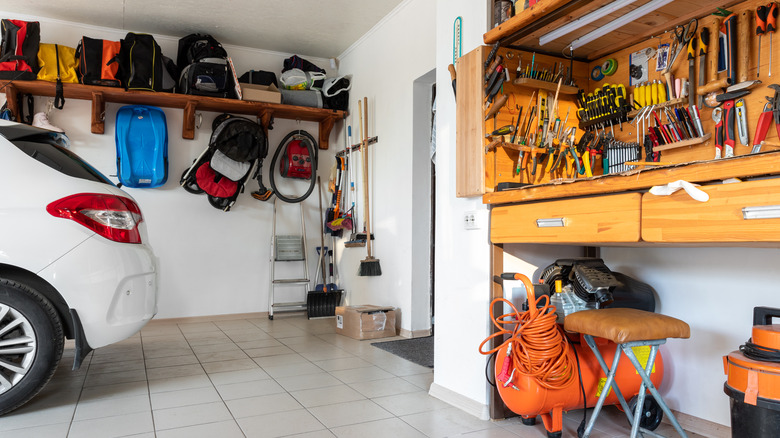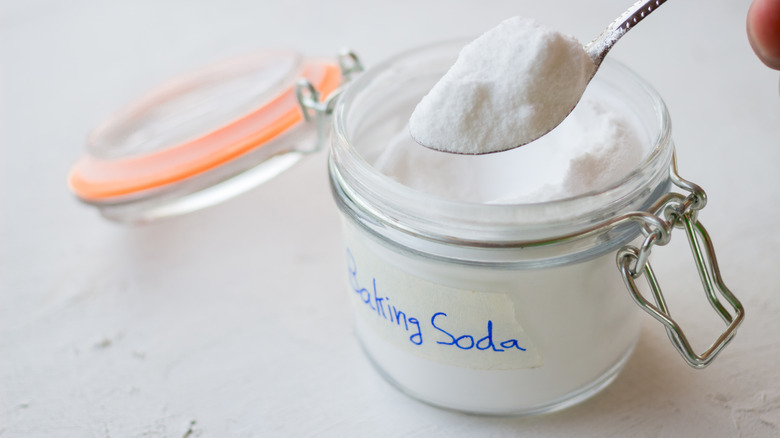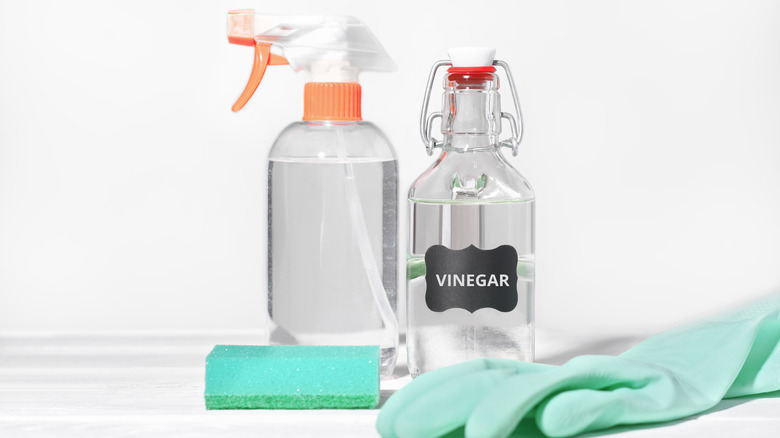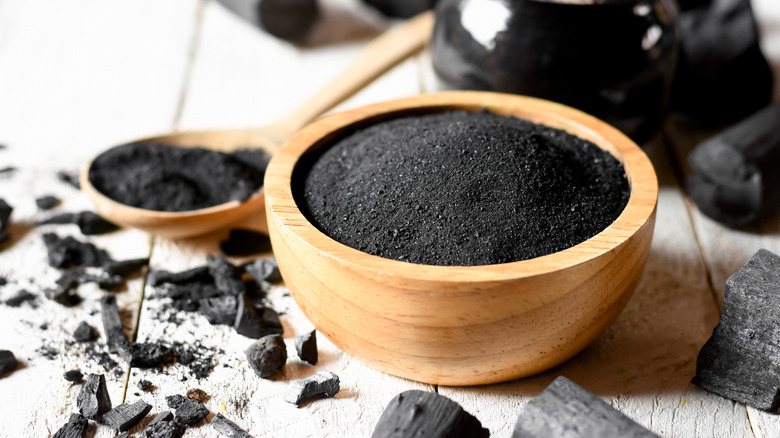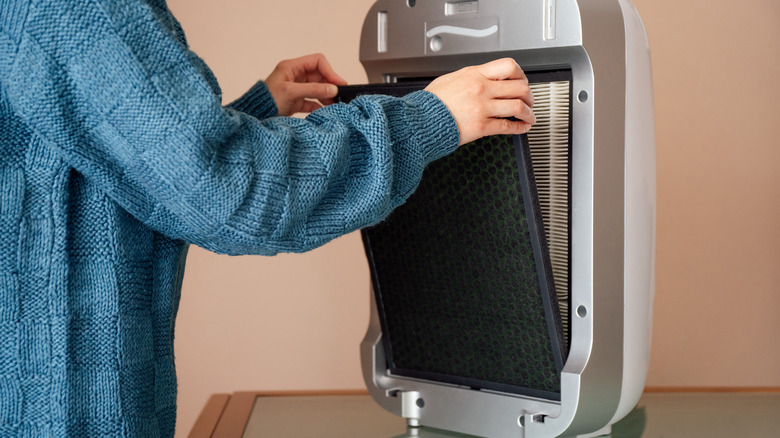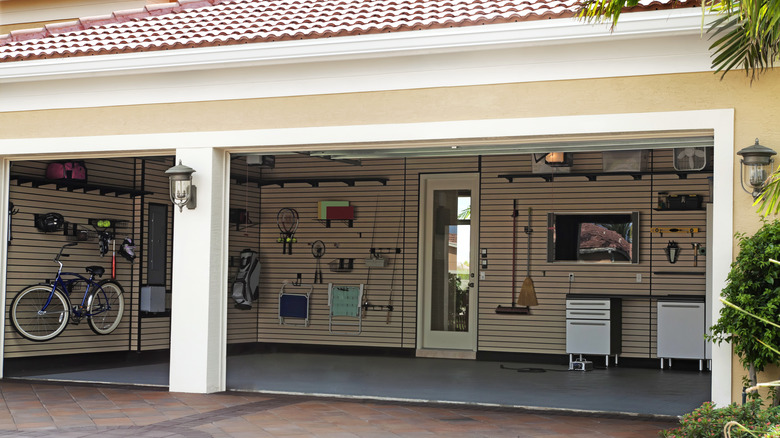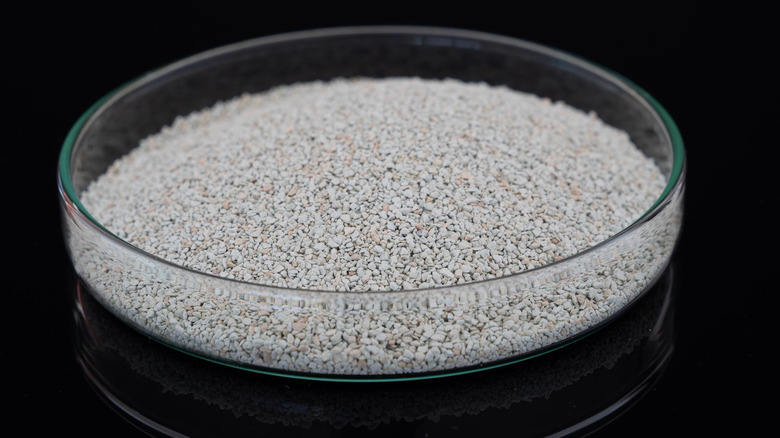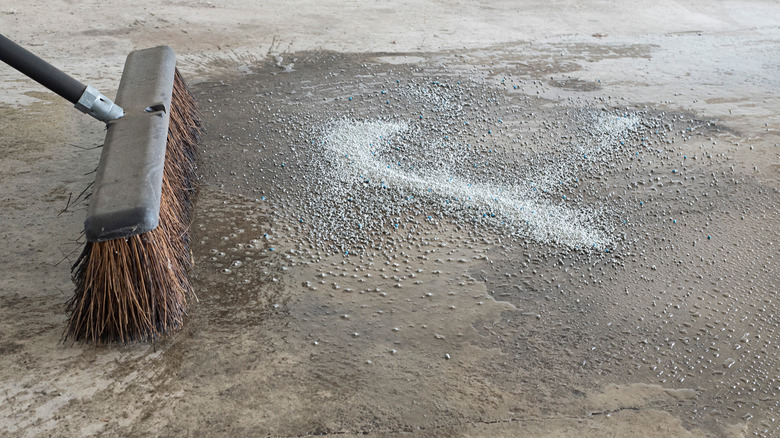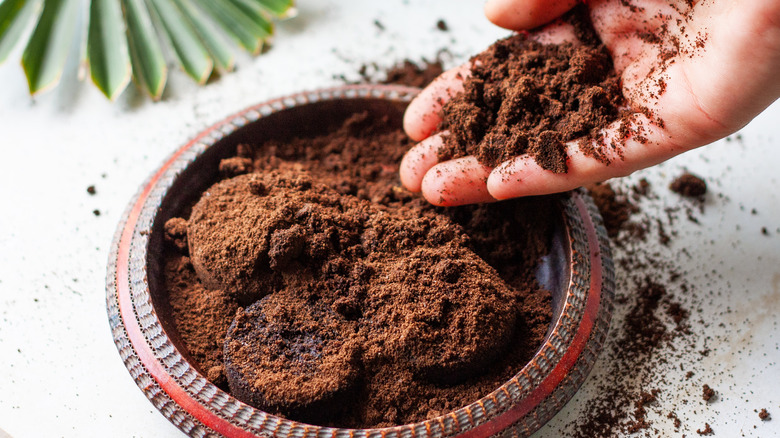Deodorize Your Smelly Garage With These Genius Tricks
Keeping your garage odor-free is challenging, and it differs significantly from ordinary home care in terms of odor removal because of hidden complications. Initially, the steps you take to clean your garage — like sweeping up the debris, wiping down any surfaces, and organizing your tools — set the stage. But they only scratch the surface; these actions don't get rid of stubborn odors. If you leave them, they can turn your garage from a functional area of your home to an unpleasant corner where you dread to go or spend time.
Winning the battle against odors in your garage requires going beyond standard cleaning methods. Instead, you should consider creative but practical solutions that take care of the smell's root cause, like decay, moisture, pests, and chemical vapors. Each option on this list, from using the odor-absorbing power of everyday household items to ventilating your space better, eliminates odors instead of masking them. Still, they require work to get the most out of them in your quest for an odor-free garage.
Spread out a layer of baking soda
To fight the funky smell in your garage using baking soda, generously sprinkle it across your garage floor. As you do, pay particular attention to areas where the bad smells seem to come from, like oil or gas leaks on the floor. If you're worried about even coverage, carefully put the baking soda in a sieve and move across the floor with it. Additionally, pour baking soda into a few large bowls and set them around your garage in strategic locations, including heavily trafficked spaces and corners. However, you should note that baking soda's effectiveness at absorbing odors will decrease over time, especially if it's damp in your garage. So you'll have to take steps to maintain the freshening. Regularly swap out the bowl of baking soda, and apply fresh ingredients to the floor. Do this at least once a week or after it gets exposed to moisture for the best results.
Baking soda's chemical properties make it an effective odor-neutralizer. The alkaline formula in baking soda makes it a base. It neutralizes acidic or strong base odor molecules, common causes of unpleasant smells. It absorbs the particles that cause the odor and changes the pH levels to create an environment where odor-producing bacteria have a hard time surviving. Baking soda addresses your odors at a molecular level to get rid of the smell from your garage.
Spray or set out a bowl of white vinegar
To use white vinegar to get rid of smelly odors, mix equal parts water and white vinegar in a spray bottle. Spray this mixture liberally onto any smelly areas in your garage, ensuring you spray both the air and any stinky surfaces, like the workbench. If you're looking for a more passive approach, put a few large bowls full of white vinegar throughout the garage, especially in smelly areas and out-of-the-way corners. At first, the vinegar will have a strong smell, which could be slightly overpowering. However, the odor will naturally dissipate in a short time, leaving behind a neutral smell. It's a good idea to set out multiple bowls so that the whole garage gets deodorized. Regularly replenish the vinegar as it dissipates to get continuous odor control.
Vinegar's acetic acid content is a powerful deodorizer and disinfectant, making it helpful in fighting garage odors. Vinegar breaks down dirt, films, oils, stains, and bacteria's structure, reducing odors. Along with reducing odors from the air and surfaces, it disinfects your garage by killing molds and bacteria that can cause odors. It's non-toxic and safe to use around pets and kids, and it's an eco-friendly alternative to chemical-based air fresheners.
Set up an essential oil diffuser
To enjoy the benefits of essential oils in your garage, pick out an essential oil diffuser that covers the size of your garage, like the Aera Diffuser, which has adjustable room size settings. Get your preferred oils and put a few drops into the diffuser. Rosemary or tea tree are both known for their strong and clean scents. Follow the instructions to fill the diffuser with water, add the oil, and then turn it on. Put your diffuser in a centralized location in your garage or near any spot where you smell the odor the strongest. Ensure it's on a stable surface and by an electrical outlet if it's not a battery-operated model. Regularly refill the water and refresh your oils to keep the smell consistent as the water runs low. Be careful if pets like to come into the garage because some essential oils are toxic to animals. You may need to choose pet-safe oils and keep them out of reach.
Some essential oils — including eucalyptus, peppermint, and orange — help manage odors because they have natural antibacterial properties. They purify the air when they break down and neutralize odors. The essential oil molecules interact with odor molecules and airborne pathogens, reducing or eliminating stinky smells in the garage. Some oils — like lemon and eucalyptus — enhance the garage's ambiance by adding clean and refreshing scents.
Set out a container of activated charcoal
Activated charcoal can work to neutralize some odors in your garage. You should put it into open containers, like mesh bags or bowls, to help maximize how much air it gets exposed to. Put these containers around your garage strategically, focusing on any smelly areas or where you have limited airflow. For the best coverage and effectiveness, you'll want several containers, placing them in each corner of your garage. Your garage's environment will affect the effectiveness of this method. Charcoal will be less effective in very humid garages because excessive moisture will saturate the charcoal, so it won't absorb odors as well. Regularly check your bowl of charcoal to ensure it's not saturated and replace it as it starts to get damp.
Activated charcoal's porous structure is the key to getting rid of odors. This structure gives it a bigger surface area for any odor-causing particles in the air to get trapped in and neutralized. It works well for a broad range of odors, including chemical vapors and musty smells, making it a versatile way to deodorize your garage. By absorbing and trapping odor-causing particles, activated charcoal helps your garage smell cleaner, which is helpful for an area where you may not have a lot of airflow.
Install an air purifier with activated carbon filters
Activated carbon filters are a solid way to remove odors from your garage, but you'll have to buy a system to house these filters, like the Austin Air HealthMate HEPA Air Purifier. This system is slightly more expensive at just over $700, but it covers up to 1,500 square feet and comes with an activated carbon filter and a five-year warranty. For smaller garages, up to 500 square feet, the Winix 4-Stage True HEPA Air Purifier is just under $330 and comes with WiFi operating capabilities and a mesh washable pre-filter. Once you decide on a device, place it in an area with the most odors or where you need more air movement. Be sure to inspect the unit and replace the filters as necessary. How often you do this will vary based on how much you use it and how dirty the air is. Generally, this means a monthly replacement. You'll also need to learn the best way to clean it between filter changes, following manufacturer instructions and recommendations.
Activated carbon filters are effective for odor control because they absorb a broad range of odor molecules as they pass through it. Once they get trapped, they won't reenter your garage, so you'll get purified air without any smells.
Ventilate your garage regularly
To minimize odors and boost your garage's ventilation, keep any garage windows open for as long as possible to let fresh air in. Make sure nothing is obstructing the windows, but you can still use screens to keep pests out. If your garage doesn't have windows or good air circulation, open the garage doors and use an exhaust fan to exchange your indoor air for fresher outdoor air. If you rely on natural ventilation, though, keep an eye on the outdoor air quality. When pollution levels are high, this may not be as effective. Regular ventilation is crucial, but remember it's contingent on external conditions and may require supplemental deodorizing methods for consistent odor control.
Regularly ventilating your garage is an effective and straightforward method to stop odors from building up. It brings fresh air inside to displace and reduce how many odor-causing particles are present. Air circulation also prevents dampness, which can encourage mildew or mold growth, which causes odors. Ventilation also helps to evacuate pollutants and toxic fumes from vehicles, lawn equipment, and stored chemicals, contributing to a healthier breathing environment.
Place zeolite rocks to absorb moisture
Zeolite rocks are natural odor absorbers and can work to reduce garage odors. Buy them online from stores like The Seed Supply, or visit your local big-box store and check the gardening section for them. Place them in a breathable container, like a mesh bag or open bowl. Put these containers in areas where the odors are strongest or in enclosed areas of your garage. Ensure your rocks are in an even layer to maximize air contact. Additionally, zeolite rocks need to be recharged regularly to keep absorbing odors. Once a month, expose your rocks to sunlight for 24 hours to recharge them. A 2021 study in the Materials (Basel) journal notes the effectiveness of zeolite rocks at stripping away odors will vary, based on the treatment they underwent. For example, thermally activated zeolite works wonderfully for moisture control, and acid-treated zeolite absorbs odors.
Zeolite rocks have unique natural properties that make them effective for odor control. It's a microporous material, absorbing different odor-causing compounds and moisture from your garage. The crystalline structure of the rocks gives them a larger surface area that effectively traps odors and pollutants on a molecular level and physically removes them from the air. Additionally, zeolite's moisture-absorbing properties help reduce the dampness that can contribute to mold and mildew growth, common sources of stinky odors in garages.
Sprinkle a cat litter deodorizer
Not only does kitty litter make cleaning up garage spills easy, but it also deodorizes. A 2023 paper in Bioresource Technology Reports notes that soybean-based kitty litter has some of the best odor-absorbing properties, like SoyKitty's plant-based litter. It's 99% dust-free, features an eco-friendly design, and offers up to three times the odor protection. Fill a shallow container with this litter and put it in stinky spaces in your garage. You want a shallow, wide dish to maximize the litter's air exposure to take care of odors. Monitor this litter because when it gets saturated, you'll have to replace it so that it keeps working. Also, if your pets wander into your garage, put your containers in areas where they won't accidentally use them. Additionally, you can add a layer of baking soda to the bottom of the container and put the kitty litter over it for more odor-absorbing power.
Cat litter comes made to tackle odors, including those in your garage. Its design focuses on absorbing moisture and trapping odor-causing particles. The porous nature of soybean-based cat litter acts like a sponge, drawing in and locking away moisture and odors. This absorption process is what makes cat litter particularly adept at neutralizing a wide range of smells, from musty odors caused by dampness to stronger, more intense scents common in garage environments.
Set bowls of coffee grounds around
Dried coffee grounds are effective at neutralizing odors, and you'll need to leave an open jar of the grounds in the garage for it to work. This will allow the grounds to release their scent and use their absorbing properties to get rid of odors at the same time. Put the jars in spots around your garage where you have strong or persistent odors. Monitor your coffee grounds for signs of mold, especially if the garage is damp. Replace them roughly once every week to keep them fresh and ensure they're a viable solution to control odors without adding mold problems.
Coffee grounds' natural composition, including nitrogen, makes them effective for getting rid of garage doors. A 2017 paper in the International Journal of Environmental Science and Development showed that coffee grounds neutralize odors by absorbing the molecules that cause unpleasant smells, including musty or stale odors common in garages. The grounds are also porous, and this helps them trap odor-causing compounds. Furthermore, the natural smell of coffee could serve as a nice, delicate scent in the garage, combatting less pleasant smells. Used coffee grounds have a dual function of odor absorption and fragrance masking, making them a simple yet efficient way to keep your garage feeling fresh.
